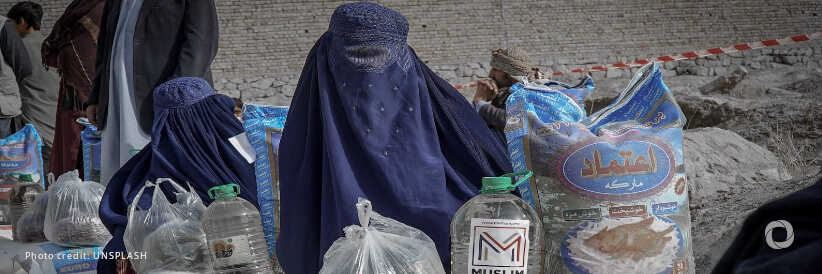Conflict. Natural disasters. Basic food shortages. Mass unemployment. The scale of the humanitarian crisis in Afghanistan is like no other. The cumulative impact of 4 decades of conflict, exacerbated by a perfect storm of drought, economic collapse, rocketing food prices, a devastating earthquake, and flooding has left millions of people facing a harrowing future.
For some of the most vulnerable, there may be no future at all. 24 million people, more than half of the population, need humanitarian aid. Child malnutrition is rife.
“During the day we only have some tea and a little bread, then at night we eat rice,” says Mina, who watches her 4 children grow thinner each day. “But there have been some days where we haven’t eaten anything at all”.
“My husband has a motor-cart, but it’s so hard for him to find work these days. Sometimes he gets work delivering bags for people from the market to their home. The past 3 days he had no fuel and couldn’t afford to buy any, so he couldn’t even go out in the cart. My husband buys food when he has some money, but he says the price of rice has doubled since last year. All we want is to find work and be able to eat enough.”
Islamic Relief has provided Mina and her family with food packs containing flour, oil, beans, salt and rice as well as blankets to help prepare her family for the harsh winter. Despite their hunger and uncertainty as to where their next meal would come from, they shared their food between 3 families, because they knew their neighbours were in need too.
Sadly, in recent weeks the family’s 1-room home in Bamyan, the walls built with dried mud, was robbed – an increasingly familiar story as people become ever more desperate.
Hopes for the future replaced by daily struggle to survive
This crisis is already taking lives. With every day that passes, more people face the prospect of starvation. Hopes of a brighter future have been replaced by a daily struggle to secure a meal.
Razia, aged 18, lives with her mother Zakia, her father, and 2 younger sisters. Razia has spent years studying to become a doctor and serve her community but for over a year teenaged girls have been barred from going to school, and many schools that have tried to re-open have been forced to close. Unable to continue her education, her dreams of public service dashed, Razia is stuck at home while her parents search for work, often in vain. Reports suggest around 850,000 girls may have left school, which could lead to a risk of early-marriage or other child exploitation.
“3 years ago, life was ok here. There were lots of jobs, I had work and could feed the children,” says her father, Gul. “But the last year has changed that – now there are no jobs. When I go to the market the prices are always increasing. The price of food and gas has gone up by 80% or more.”
The family have received food from Islamic Relief at Ramadan, as well as essential survival items such as blankets and clothing. However, as this crisis deepens, hunger is a frequent visitor to the household. On some days the family goes without food, as they have no oil to cook and sometimes can’t even afford the gas to boil some potatoes.
Islamic Relief has been a lifeline in Afghanistan for over 20 years Umair Hasan, country director for Islamic Relief in Afghanistan, says: “With every day this crisis envelops yet more people. Whole villages face the prospect of no work and no food. With the harsh winter weather around the corner, time is running out to prevent a humanitarian catastrophe, particularly in communities devastated by recent natural disasters including an earthquake and flash flooding.”
Islamic Relief has remained by the side of the Afghan people for over 20 years, and continue to offer a lifeline throughout this crisis. Right now, the interventions include distributing food packages and hygiene kits as well as cash, education, and healthcare services to vulnerable families across 5 provinces.
The incredible, resilient people of Afghanistan have faced countless challenges over the decades, but many are afraid of what lies ahead as winter draws closer.

